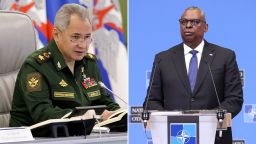More than two dozen liberal House members are calling on President Joe Biden to shift course in his Ukraine strategy and pursue direct diplomacy with Russia to bring the months-long conflict to an end.
In a letter sent to Biden on Monday, the group of 30 Democrats praise Biden’s efforts to date at supporting Ukraine while avoiding direct US involvement on the ground. But they suggest a more forceful attempt at bringing the war to an end through diplomacy is necessary to prevent a long and slogging conflict.
“Given the destruction created by this war for Ukraine and the world, as well as the risk of catastrophic escalation, we also believe it is in the interests of Ukraine, the United States, and the world to avoid a prolonged conflict,” the group, led by Congressional Progressive Caucus chairwoman Pramila Jayapal, write in the letter. “For this reason, we urge you to pair the military and economic support the United States has provided to Ukraine with a proactive diplomatic push, redoubling efforts to seek a realistic framework for a ceasefire.”
The letter comes at a critical moment in the war, as Russia increasingly targets civilian infrastructure with a particular focus on cutting power supplies to Ukrainian citizens ahead of winter.
In Congress, questions have grown at the willingness of lawmakers to sustain the massive financial and military support that has gone to Ukraine. Some Republicans have threatened to cut aid to the country if they take control of Congress in November.
The liberal Democrats, in their letter, say that more direct attempts at engaging Moscow in diplomacy were necessary as the war drags on.
“We are under no illusions regarding the difficulties involved in engaging Russia given its outrageous and illegal invasion of Ukraine and its decision to make additional illegal annexations of Ukrainian territory,” the lawmakers wrote. “However, if there is a way to end the war while preserving a free and independent Ukraine, it is America’s responsibility to pursue every diplomatic avenue to support such a solution that is acceptable to the people of Ukraine.”
After the letter garnered sharp criticism from some progressives, including Reps. Mark Pocan of Wisconsin and Jake Auchincloss of Massachusetts, Jayapal sought to clarify the caucus’ position and affirm its support of the administration’s policy.
“Let me be clear: we are united as Democrats in our unequivocal commitment to supporting Ukraine in their fight for their democracy and freedom in the face of the illegal and outrageous Russian invasion, and nothing in the letter advocates for a change in that support,” Jayapal said in a statement on Tuesday morning.
John Kirby, the strategic communications coordinator at the National Security Council, said the White House had received the letter.
“We certainly appreciate the sentiments expressed by these members of Congress,” Kirby said.
“We have been working with members of Congress throughout this entire process, especially when we have needed additional funding to support Ukraine’s defense needs,” Kirby said. “And it’s been done in full collaboration in full transparency with members of Congress. And that is exactly the way the President wants to continue going forward.”
Still, Kirby said there were no indications that Russian President Vladimir Putin was willing to engage in serious diplomacy to bring the war to an end.
“When you see and you listen to his rhetoric, and you see the other things, be they atrocities, the war crimes, the airstrikes against civilian infrastructure that the Russians are committing, it’s clear Mr. Putin is in no mood to negotiate,” Kirby said.
He said it would be up to Ukraine and its president, Volodymyr Zelensky, when the time is right to return to the negotiating table.
“Mr. Zelensky gets to determine when he thinks that’s the right time, and Mr. Zelensky gets to determine, because it’s his country, what success looks like, what victory looks and what sort of terms he willing to negotiate on,” Kirby said. “We’re not going to dictate that.”
This story has been updated with additional details.
CNN’s Manu Raju and Shawna Mizelle contributed to this report.







